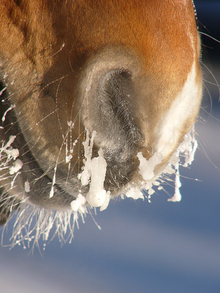With winter weather taking a serious turn in much of the USA it becomes extremely important to make sure horses are not left out of sight and out of mind. During cold weather, it sometimes becomes more difficult to monitor horse health, so daily once overs are more important than ever.

Horse's muzzle encrusted with snow
During cold weather, it sometimes becomes more difficult to monitor horse health, so daily once-overs are more important than ever to make sure that any developing health issues are addressed in a timely manner.
Following are tips on 8 areas of horse health that need special attention during cold winter months:
1. Dental care:
It’s important to monitor your horse’s teeth all year-round, but in winter it is especially critical. If he can’t chew properly, he’s not going to receive the full benefit of the feed you’re providing. That means wasted calories, wasted nutrients, and a horse whose diet isn’t meeting his needs.
2. Nutritional needs:
Speaking of diets, now is a great time to re-evaluate your horse’s program, ideally with the help of your veterinarian or an equine nutritionist. His nutritional needs may change as he ages, so a feeding program that worked five years ago might not meet his needs now.
As with any horse, the basis of your 'horse’s diet should be high quality forage. Hindgut fermentation of long-stem forage is your horse’s primary heat source in the colder months, so a steady supply of quality hay is critical.
3. Hoof health:
Ground conditions change daily throughout the winter, from warm and wet to frozen solid. These fluctuations can wreak havoc on your horse’s hooves, so monitor his feet and work closely with your farrier to keep his hooves in tip-top shape.
4. Skin and coat health:
Horses’ tend to be more susceptible to skin infections and other problems caused by harsh winter conditions. Older horses especially have a lowered ability to regulate their body temperature, and therefore may need additional blanketing and protection from the elements to keep them warm and cozy.
5. Joint health:
Years of travelling, training, and competing can really take a toll on your horse’s joints, but luckily there are steps you can take to help. A joint supplement tailored to the specific needs of your senior horse can help keep him comfortable. Look for ingredients like glucosamine, chondroitin sulfate, and HA for joint tissue health and MSM, devil’s claw, and yucca to support a healthy inflammatory response and help keep him moving freely.
6. Weight loss:
Many horses drop weight and lose muscle tone over the winter, so it’s important to monitor your horse’s body condition score. To make sure you have an accurate picture of his weight, remove his blanket regularly and work your fingers through his coat to feel the fat cover across his ribs, withers, behind his shoulder, over his back, and his tail head, in addition to his neck.
If your senior horse is losing weight, talk to your veterinarian about possible causes. If everything checks out, consider adding a supplement with healthy fats and amino acids to support a healthy weight, as well as prebiotics, probiotics, and enzymes for proper digestion.
7. Immune function:
As they age, horses’ immune functions start to lose efficiency and efficacy, which means your horse may be more prone to illness or slower to heal from injury as years go by. For these reasons, it is especially important to have your vet examine and vaccinate your horse once or twice annually, to help protect and keep him healthy.
Additionally, having your vet out regularly allows him or her to keep a close eye on your horse and monitor for common conditions such as Cushing’s. You may also want to consider adding a supplement to maintain a healthy immune system. Look for antioxidants such as vitamin C, vitamin E, selenium, and grape seed extract, which help support normal immune function.
8. Proper hydration:
Many horses decrease their water intake during colder months, due to cold, icy water. But adequate water consumption is key to temperature regulation, many metabolic functions, and is also essential for proper digestion. Make sure your horse has 24/7 access to fresh, water that is unfrozen. Try hanging a heated bucket in your horse’s stall and consider adding salt to encourage him to drink.
